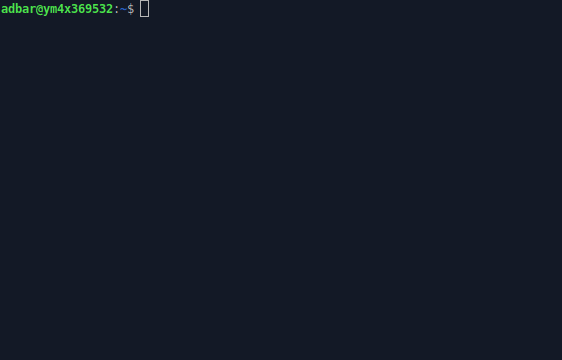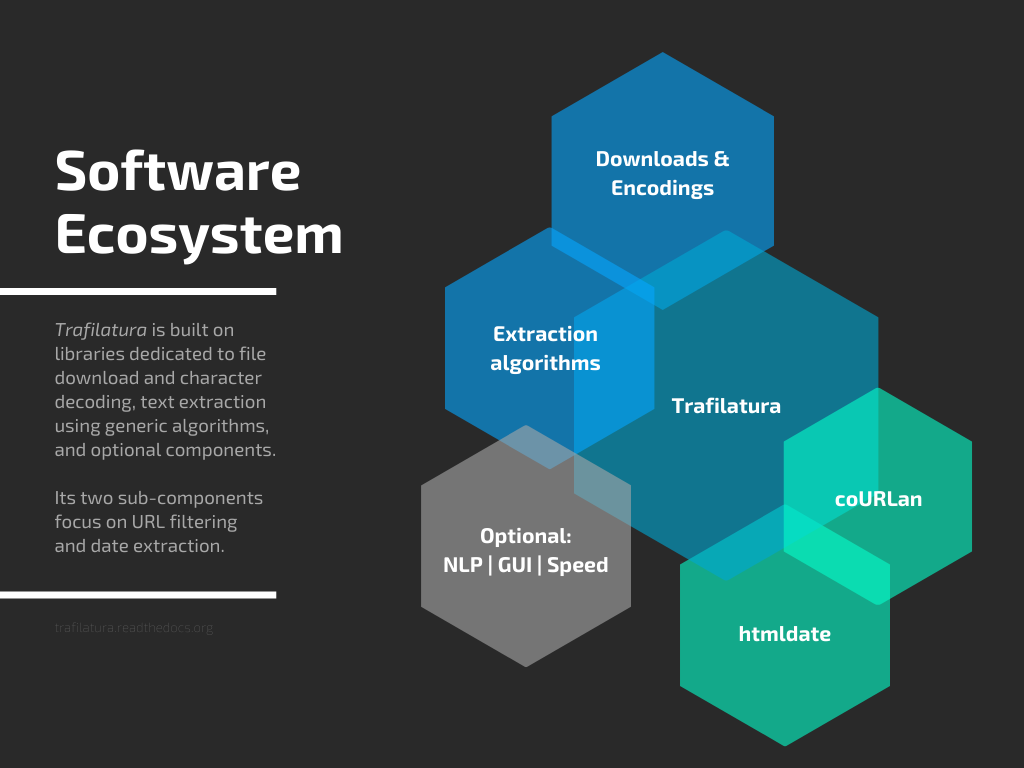





Trafilatura is a cutting-edge Python package and command-line tool designed to gather text on the Web and simplify the process of turning raw HTML into structured, meaningful data. It includes all necessary discovery and text processing components to perform web crawling, downloads, scraping, and extraction of main texts, metadata and comments. It aims at staying handy and modular: no database is required, the output can be converted to multiple commonly used formats.
Smart navigation and going from HTML bulk to essential parts can alleviate many problems related to text quality, by focusing on the actual content, avoiding the noise caused by recurring elements (headers, footers etc.), making sense of the data with selected information. The extractor is designed to be robust and reasonably fast, it runs in production on millions of documents.
The tool's versatility makes it useful for a wide range of applications leveraging web content for knowledge discovery such as quantitative and data-driven approaches. Trafilatura is used in the academic domain and beyond (e.g. in NLP, SEO, business analytics).
- Advanced web crawling and text discovery:
- Focused crawling adhering to politeness rules
- Support for sitemaps (TXT, XML) and feeds (ATOM, JSON, RSS)
- Smart navigation and URL management (blacklists, filtering and deduplication)
- Parallel processing of online and offline input:
- Live URLs, efficient and polite processing of download queues
- Previously downloaded HTML files and parsed HTML trees
- Robust and customizable extraction of key elements:
- Main text (common patterns and generic algorithms like jusText and readability)
- Metadata (title, author, date, site name, categories and tags)
- Formatting and structure: paragraphs, titles, lists, quotes, code, line breaks, in-line text formatting
- Optional elements: comments, links, images, tables
- Extensive configuration options
- Multiple output formats:
- Text (minimal formatting or Markdown)
- CSV (with metadata, tab-separated values)
- JSON (with metadata)
- XML (with metadata, text formatting and page structure) and TEI-XML
- Add-ons:
- Language detection on extracted content
- Graphical user interface (GUI)
- Speed optimizations
- Actively maintained with support from the open-source community:
- Regular updates, feature additions, and optimizations
- Comprehensive documentation
Trafilatura consistently outperforms other open-source libraries in text extraction benchmarks, showcasing its efficiency and accuracy in extracting web content. The extractor tries to strike a balance between limiting noise and including all valid parts.
For more detailed results see the benchmark. The results can be reproduced, see the evaluation readme <https://github.com/adbar/trafilatura/blob/master/tests/README.rst>_ for instructions.
| 750 documents, 2236 text & 2250 boilerplate segments (2022-05-18), Python 3.8 | |||||
|---|---|---|---|---|---|
| Python Package | Precision | Recall | Accuracy | F-Score | Diff. |
| html_text 0.5.2 | 0.529 | 0.958 | 0.554 | 0.682 | 2.2x |
| inscriptis 2.2.0 (html to txt) | 0.534 | 0.959 | 0.563 | 0.686 | 3.5x |
| newspaper3k 0.2.8 | 0.895 | 0.593 | 0.762 | 0.713 | 12x |
| justext 3.0.0 (custom) | 0.865 | 0.650 | 0.775 | 0.742 | 5.2x |
| boilerpy3 1.0.6 (article mode) | 0.814 | 0.744 | 0.787 | 0.777 | 4.1x |
| baseline (text markup) | 0.757 | 0.827 | 0.781 | 0.790 | 1x |
| goose3 3.1.9 | 0.934 | 0.690 | 0.821 | 0.793 | 22x |
| readability-lxml 0.8.1 | 0.891 | 0.729 | 0.820 | 0.801 | 5.8x |
| news-please 1.5.22 | 0.898 | 0.734 | 0.826 | 0.808 | 61x |
| readabilipy 0.2.0 | 0.877 | 0.870 | 0.874 | 0.874 | 248x |
| trafilatura 1.2.2 (standard) | 0.914 | 0.904 | 0.910 | 0.909 | 7.1x |
- Most efficient open-source library in ScrapingHub's article extraction benchmark
- Best overall tool according to Bien choisir son outil d'extraction de contenu à partir du Web (Lejeune & Barbaresi 2020)
- Best single tool by ROUGE-LSum Mean F1 Page Scores in An Empirical Comparison of Web Content Extraction Algorithms (Bevendorff et al. 2023)
Getting started with Trafilatura is straightforward. For more information and detailed guides, visit Trafilatura's documentation:
- Installation
- Usage: On the command-line, With Python, With R
- Core Python functions
- Interactive Python Notebook: Trafilatura Overview
For video tutorials see this Youtube playlist:
Trafilatura is distributed under the GNU General Public License v3.0. This license promotes collaboration in software development and ensures that Trafilatura's code remains publicly accessible.
If you wish to redistribute this library but are concerned about the license conditions, consider interacting at arms length, combining with compatible licenses, or contacting the author for more options.
For insights into GPL and free software licensing with emphasis on a business context, see GPL and Free Software Licensing: What's in it for Business?
Contributions of all kinds are welcome. Visit the Contributing page for more information. Bug reports can be filed on the dedicated issue page.
Many thanks to the contributors who extended the docs or submitted bug reports, features and bugfixes!
Developed with practical applications of academic research in mind, this software is part of a broader effort to derive information from web documents. Extracting and pre-processing web texts to the exacting standards of scientific research presents a substantial challenge. Web corpus construction involves numerous design decisions, this software package simplifies text data collection and enhances corpus quality. It is currently used to build text databases for linguistic research.
Trafilatura is an Italian word for wire drawing symbolizing the industrial-grade extraction, refinement and conversion process.
Reach out via the contact page for inquiries, collaborations, or feedback. See also Twitter/X for the latest updates.
This work started as a PhD project at the crossroads of linguistics and NLP, this expertise has been instrumental in shaping Trafilatura over the years. It has first been released under its current form in 2019, its development is referenced in the following publications:
- Barbaresi, A. Trafilatura: A Web Scraping Library and Command-Line Tool for Text Discovery and Extraction, Proceedings of ACL/IJCNLP 2021: System Demonstrations, 2021, p. 122-131.
- Barbaresi, A. "Generic Web Content Extraction with Open-Source Software", Proceedings of KONVENS 2019, Kaleidoscope Abstracts, 2019.
- Barbaresi, A. "Efficient construction of metadata-enhanced web corpora", Proceedings of the 10th Web as Corpus Workshop (WAC-X), 2016.
Trafilatura is used in the academic domain, chiefly for data acquisition in corpus linguistics, natural language processing, and computational social science. Here is how to cite it:

@inproceedings{barbaresi-2021-trafilatura,
title = {{Trafilatura: A Web Scraping Library and Command-Line Tool for Text Discovery and Extraction}},
author = "Barbaresi, Adrien",
booktitle = "Proceedings of the Joint Conference of the 59th Annual Meeting of the Association for Computational Linguistics and the 11th International Joint Conference on Natural Language Processing: System Demonstrations",
pages = "122--131",
publisher = "Association for Computational Linguistics",
url = "https://aclanthology.org/2021.acl-demo.15",
year = 2021,
}This software is part of a larger ecosystem. It is employed in a variety of academic and development projects, demonstrating its versatility and effectiveness. Case studies and publications are listed on the Used By documentation page.
Jointly developed plugins and additional packages also contribute to the field of web data extraction and analysis:
Corresponding posts can be found on Bits of Language. The blog covers a range of topics from technical how-tos, updates on new features, to discussions on text mining challenges and solutions.
Impressive, you have reached the end of the page: Thank you for your interest!

